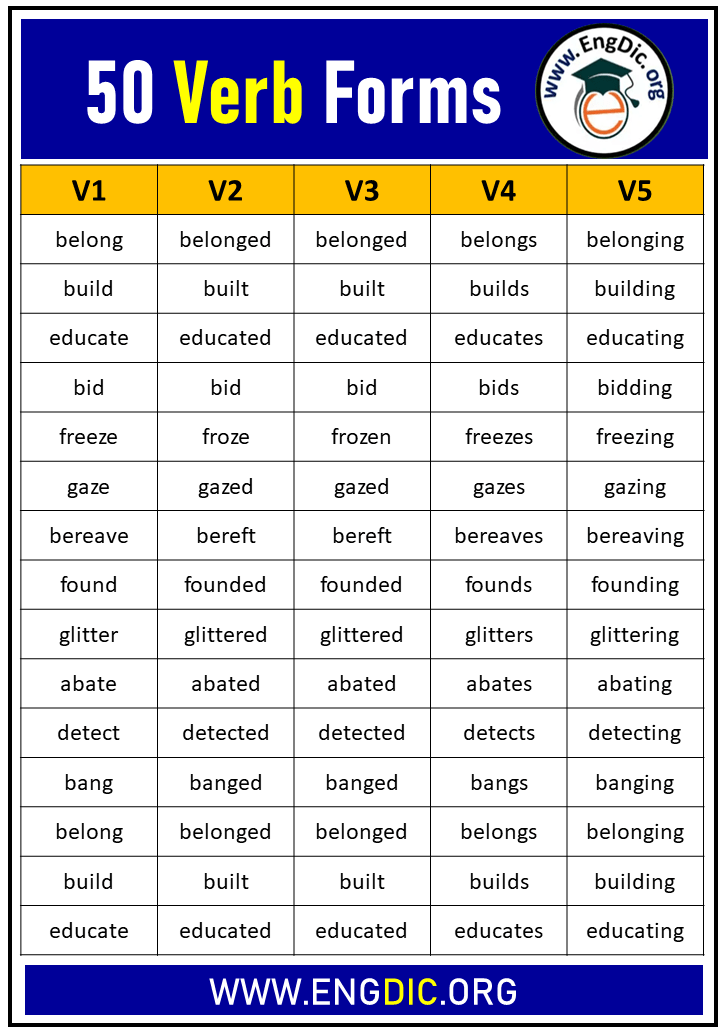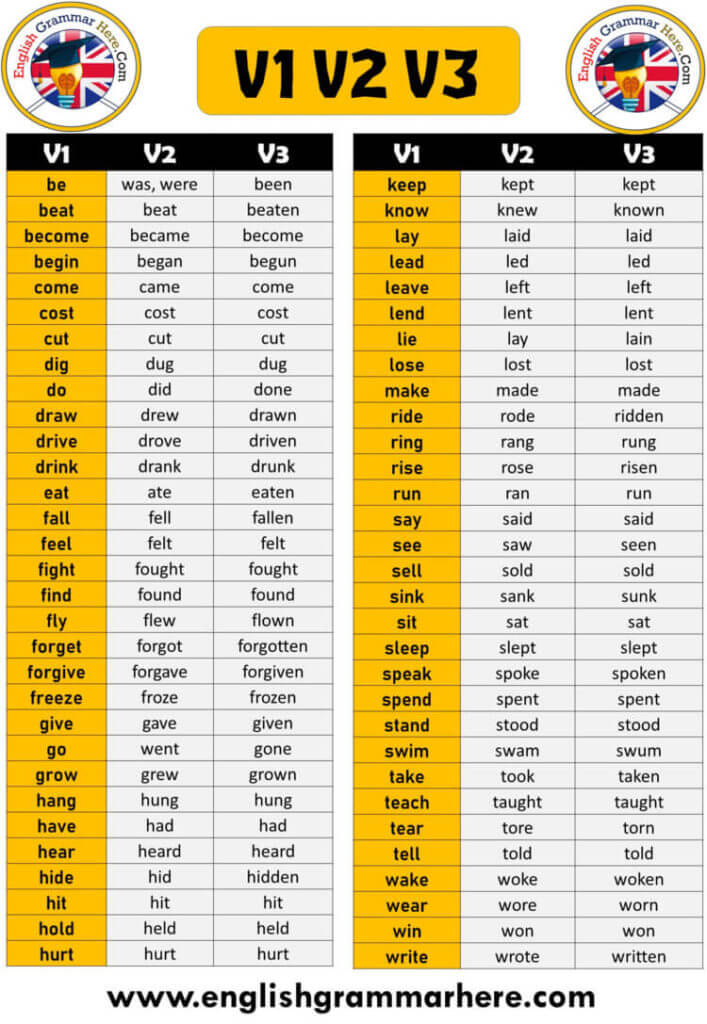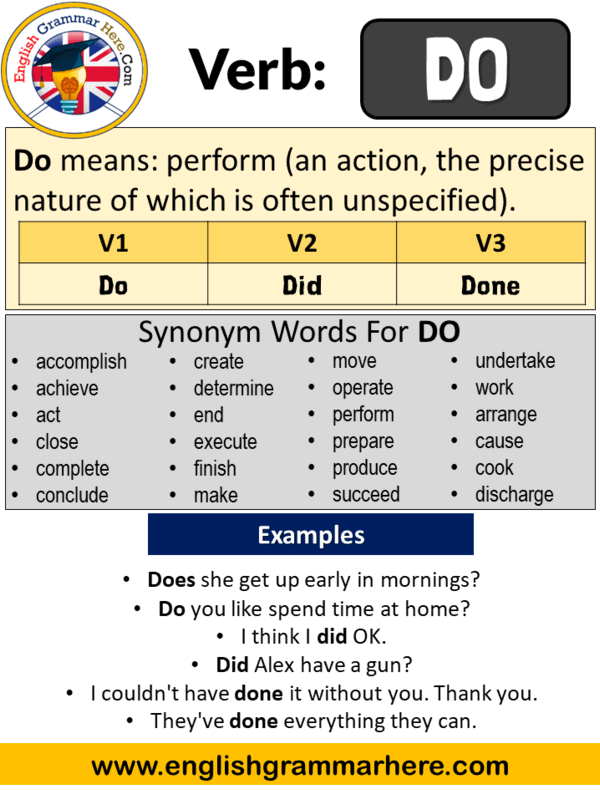
50 Verb Forms V1 V2 V3 V4 V5 EngDic
The V3 form is identical to the V2 form. The V3 form is "liked". Liked is used in the past or present perfect tense. + In the present perfect tense, we use the word V1 as 'have + liked' or 'has + liked'.

V1 v2 v3 list in english Artofit
The V3 form of this verb is 'liked'. 'Liked' is used in the case of Past Perfect Tense or Present Perfect Tense. If the question is in the Present Perfect Tense, we use the word like as 'have + liked' or 'has + liked'. The subjects I, you, we are used as 'have + liked'. The subjects he, she, it, are used as 'has + liked'.

English V1 V2 V3, Definition, Examples and Detailed List Table of Contents V1, V2 and V3Where is
Verb Tenses Past simple — like in past simple liked (V2) . Future simple — like in future simple is like (will + V1) . Present Perfect — like in present perfect tense is liked (have/has + V3) . Past Perfect — like in past perfect tense is liked (had + V3) . like regular or irregular verb? 👉 Is 'like' a regular or irregular verb?

the english dictionary is shown in pink and blue, with words that read v2v3
Synonyms similar to, the same as, identical to, such as, for example, for instance, in particular, as, namely, viz., similar, much the same, more or less the same, not unlike, comparable, corresponding, correspondent, resembling, alike, approximating, analogous, parallel, equivalent, cognate, related, of a kind, akin, kindred,

V1 V2 V3 Examples English Study Here English vocabulary words learning, English study
This is a list of some irregular verbs in English. Of course, there are many others, but these are the more common irregular verbs. You can test yourself with these fun irregular verbs quizzes. V1. Base Form. V2. Past Simple. V3. Past Participle.

Verb 1 2 3, V1 V2 V3 Verb Form List in English English Grammar Here
The Basics What is 'Like'? Like - Past Tense (V2) Like - Past Participle (V3) Like - Verb Forms (V1, V4, V5) V1 - The base form of 'like' is 'like.' V4 - The fourth form of 'like' is 'liking.' V5 - The fifth form of 'like' is 'likes.' Common Uses of 'Like' FAQ Conclusion The Basics: What is 'Like'?

Bite Past Simple, Simple Past Tense of Bite Past Participle, V1 V2 V3 Form Of Bite Bite means a
Verb forms refer to the different ways in which a verb can be used to represent tense, number, gender, voice and mood. In English grammar, a verb is said to have five main forms named V1, V2, V3, V4, and V5. Learn about each of these forms and go through the list of verb forms given in the article to understand and use them better.

Verb forms v1 v2 v3 v4 v5 list in grammar Artofit
Here are Verb Forms v1 v2 v3 v4 v5 pdf Like means: like, approve, appreciate, enjoy, applaud, care Synonym Words For Like like approve appreciate enjoy applaud care be pleased with affect be attracted love fondle pet Example Sentences with Like, Liked V1 V2 V3 Advertisements He likes to play football and plays really well.

V3 Designs
Present I like you like he/she/it likes we like you like they like Preterite I liked you liked he/she/it liked we liked you liked they liked Present continuous I am liking you are liking he/she/it is liking we are liking you are liking they are liking Present perfect I have liked you have liked

English Participles, V1 V2 V3 List V1 V2 V3 be was, were been beat beat beaten became
Grammar Rules Grammar rules Verbs Irregular Verbs List Irregular Verbs List This list contains all the irregular verbs of the English language. Each entry includes the base or bare infinitive first, followed by the simple past (V2) form and the past participle (V3) form.

Verb 3 Write Techno Brain News
At school, students often learn by heart the base, past simple and past participle (sometimes called V1, V2, V3, meaning Verb 1, Verb 2, Verb 3) for irregular verbs. They may spend many hours chanting: sing, sang, sung; go, went, gone; have, had, had; etc. They do not learn these for regular verbs for one very simple reason - the past simple and past participle are always the same: they are.

Get Past Simple, Simple Past Tense of Go, V1 V2 V3 Form Of Go Get means come to have o
Like verb forms V1 V2 V3 V4 Conjugation of Like Simple / Indefinite Present Tense I like teddy bears. He/She/It likes teddy bears. You/We/They like teddy bears. Simple Past Tense I liked teddy bears. He/She/It liked teddy bears. You/We/They liked teddy bears. Simple Future Tense I will/shall like teddy bears. He/She/It will like teddy bears.

Do Past Simple, Simple Past Tense of Do Past Participle, V1 V2 V3 Form Of Do English Grammar Here
Like Past Simple, Past Participle, V1 V2 V3 Form of Like Verb; Like Meaning; approve, appreciate, enjoy, applaud V1, V2, V3, V4, V5 Form of Like Base Form Past Form Past Participle like liked liked Base Form s/es/ies ing Form like likes liking Synonym for Like approve appreciate enjoy applaud care be pleased with affect be attracted love fondle pet want request ask ask for require Opposite of.

PRODUCT V3 Model 14 Graphing moderated mediation PROCESS V3
Like Verb Forms V1 V2 V3 V4 V5. Base Form/Infinitive (V1): Like: Past Tense (V2): Liked: Past Participle Form (V3): Liked: Present Participle/Gerund (V4): Liking: 3rd Person Singular (V5):. Present Participle Form of Like is Liking. Example: Sarah is liking the black cat. Like 3rd Person Singular: 3rd Person Singular of Like is Likes.

Write the (V3) form of the following verbs Crossword Labs
Verb Forms v1 v2 v3 pdf V1, V2, V3 Pdf When learning English you need to know the meaning of certain words first, and then sort the words appropriately according to grammatical rules. Verbs in a regular structure can be transformed with a simple rule, whereas in irregular verbs, this situation is slightly different.

Verb form v1 v2 v3 v4 v5 50 examples Brainly.in
Grammar Point want / like / love / hate / think want / like / love / hate / think. These verbs belong to a group known as stative verbs because they describe a state rather than an action (although think can describe either an action or a state). Stative verbs are not usually used in the progressive tenses. However, it is becoming more common for some stative verbs to be used with progressive.